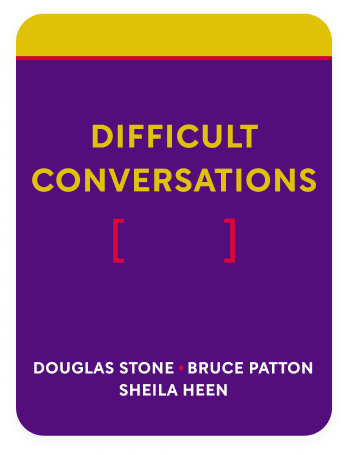

This article is an excerpt from the Shortform book guide to "Difficult Conversations" by Douglas Stone, Bruce Patton, Sheila Heen. Shortform has the world's best summaries and analyses of books you should be reading.
Like this article? Sign up for a free trial here .
Do you find it difficult to talk about your feelings? Do you try to keep your emotions bottled up and process them internally?
We tend to avoid our feelings, especially in difficult conversations, because we feel they get in the way of progress, or are embarrassing, or don’t matter. It’s also scary to talk about your feelings as it leaves you feeling vulnerable.
Here’s why it’s important to talk about your feelings and how to do it constructively.
Why It’s Important to Talk About Your Feelings
Ignoring your feelings removes an integral component of any relationship. Emotions will come out one way or another, and you can either acknowledge and embrace your feelings and deal with them constructively, or you can deal with the aftermath of holding them back.
If you find the courage to talk about your feelings, they can be useful; if you avoid it, they’ll color your communication, ruin your relationships, and make you feel worse about yourself.
Why Feelings Have to Come Out
No negotiation, no matter how skillful, will resolve a difficult conversation if the feelings at the heart of the matter have been ignored. Difficult conversations that leave out feelings often leave both people feeling dissatisfied — and the emotions still find their way into the conversation.
Unresolved or unaddressed feelings can come through in our tone of voice, our posture, and our language. And you might think you can conceal it, but you’re wrong. Studies show that most people are bad at picking up on factual lies, but good at picking up on unspoken emotion. Unexpressed emotions can even cause you to totally break away from relationships based on how many unresolved feelings you have.
When we bottle up our emotions, it also makes us worse listeners. Usually, when people are having trouble listening, it’s actually because they’re having trouble expressing their own thoughts or feelings. Our hidden emotions routinely bring our focus back to ourselves. Instead, when you talk about your feelings openly, our head clears and we can focus on and be curious about the other person’s feelings.
Lastly, we suffer when we keep our feelings to ourselves. Our self-esteem usually drops, and we feel like pushovers for not being able to express ourselves. And, if you don’t talk about your feelings, you keep an important part of who you are out of our relationships.
Managing Emotions
For some people, unexpressed emotions come out in unmanageable ways, like crying or exploding or lashing out at others. Some people think these episodes are proof that they “feel too much” — but the reality is that these episodes are the result of not sharing emotions enough.
The Feelings Conversation will only improve for the better if we work at getting better at sharing our feelings. The more skilled you become at that, the easier difficult conversations will become.
The basic guidelines for sharing your feelings are as follows:
- Sort out what your own feelings are.
- Negotiate them with yourself first.
- Share your feelings — not your judgments — with the other person.
Sorting Out Your Feelings to Talk About Them
We assume we know what we feel, when in reality, most of us don’t. We recognize major emotions, but fail to identify the complexities or the reasons. Feelings are usually more subtle and complex than we realize. They sometimes disguise themselves as emotions we’re more comfortable with, or they can disguise themselves as judgments against or attributions to other people.
Know Your Emotional Footprint
First, you need to know your own “emotional footprint,” what feelings we were taught are okay or not okay to feel or express. This is usually based on what our families taught us growing up. You can start to pinpoint your emotional footprint by asking yourself a simple set of questions:
- What emotions do you feel comfortable identifying?
- Which feelings were openly discussed in your family?
- Which emotions were never discussed?
Every person has a unique emotional footprint, and it will shift depending on what relationship you’re in. For example, the way you behave emotionally with your coworker will be different than how you behave with a romantic partner. Observing your emotional footprint in different settings will help you flesh out the whole picture.
Accepting Feelings
Once you become more aware of your own emotional footprint, the next step is to start accepting that your feelings are normal and natural. There are no wrong feelings; feelings just are. It’s how we deal with our feelings that can be better or worse depending on the situation.
A good comparison is an arm or a leg. An arm and a leg are just body parts, just there — however, we can do things with our arms and legs that hurt other people. That doesn’t mean the arm is wrong, it means we need to change what we’re doing with it.
Feelings aren’t good or bad. Some may feel better or worse, but sometimes the worst feelings are the ones that help us improve the most. Your feelings won’t always make you happy, and they won’t always make sense, but they always are.
Furthermore, your feelings don’t determine whether you’re a good or bad person. Good people can have “bad” feelings. Everyone feels anger. Everyone fails. Actions speak louder than feelings, and those we can control.
When we hide emotions we’re uncomfortable with, we can end up blocking our other emotions, as well. Hiding our emotions inhibits our ability to show any emotions — happiness can get diminished alongside anger or fear or vulnerability. It can also lead us to take out our hidden feelings on others. Wanting to blame someone is a surefire sign that you’re hiding some feelings, or are unaware that they exist.
Sometimes, feelings can be so bad that we shut ourselves off from traumatic experiences and feelings that are too much to bear. This is normal. But these repressed feelings will still affect how you function, so it’s better to start exploring them and work through them when you can. Therapy and friends can help you do this.
The Validity of Your Feelings
Your feelings are just as important as someone else’s. Some of us have learned to prioritize other people’s feelings. When we put others’ needs and feelings before our own, we undervalue ourselves and teach others that it’s okay to ignore our feelings.
We think by hiding our feelings and dealing with someone else’s that we can “save the relationship,” whatever it is. But the reality is that if you don’t talk about your feelings, suppressed energy will slowly erode the relationship. Remember, feelings will come out, in some way, in some form. By not valuing our own feelings, we end up doing a disservice to the relationship we’re trying to improve.
Delve Deeper
Usually, there’s one emotion at the forefront of what we’re feeling — but there are often a lot of other smaller feelings beneath the main one. Look for those. Becoming more familiar with the range and nuances of feelings can help us identify all the feelings at the heart of the issue.
For example, every time a man calls his mother, she asks him how his job search is going, which he hates. The primary feeling might be that he’s annoyed his mom keeps asking — doesn’t she know he’d tell her if he got a job? — but there are probably a lot of other feelings at play here. He might be embarrassed that he hasn’t found a job yet, or feel guilty that his mom worries about him, or angry and sad that he hasn’t found a job yet. All these feelings are beneath the surface.
Negotiating Your Feelings
Feelings aren’t gospel truths — they’re perceptions, meant to be negotiated. The end goal is to negotiate your feelings with the other person involved in the difficult conversation — but in order to do that, one author offers up these 2 rules:
- Get all your feelings into the conversation, but…
- Negotiate them with yourself first.
Most of us assume our feelings should be shared “as is.” But feelings are based in our perception of things — and our perception of things can change. Feelings are formed in response to thoughts. To start to change your feelings, you have to alter your thinking.
Imagine that you’re scuba diving, and a shark glides into view. Your first thought is, “Sharks are dangerous,” so your first feeling is to be afraid, maybe even panicked. Then, you realize it’s a reef shark, which doesn’t feed on humans, so your panic subsides. Maybe you even become curious about the shark’s behavior now that you know what it is. This is a change in perception, not a change in the “issue,” the shark. Changing your perception of an issue can change your emotions regarding that issue.
Three Steps to Negotiate Your Feelings
1. Examine your story. Our perception is essentially the story we’re telling ourselves about what’s going on. To alter our thinking, we have to become aware of the story going on inside our heads. Articulate the story you’re telling yourself about the situation. Then ask yourself what story the other person might be telling themselves.
2. Examine the intentions. Remember, going into difficult conversations, we’re almost always assuming we know how the other person intended something to come off. This is part of the story we tell ourselves, and also needs to be examined. Is it possible the other person acted unintentionally? What about your own intentions?
3. Remember the contribution system. How have both parties contributed to the situation? What patterns in the relationship or in either party’s behavior are reinforcing this contribution?
Half of the work in these questions you can do on your own — that’s essentially your homework leading up to a difficult conversation. But you won’t be able to get all the answers until you finally talk to the other person. The other half of the work requires their answers.
Sharing Your Feelings
It’ll be hard to talk about your feelings because you must negotiate your them with the other person. The goal is to describe your feelings carefully and specifically. Being emotional isn’t the same as sharing your emotions — you can be externally emotional without expressing anything clearly at all.
Avoid venting. This greatly reduces your ability to be productive in the conversation, and greatly increases the change of sparking the other person’s defensiveness.
Avoid Judgments
Judgments aren’t feelings, but they often emerge from our feelings. Sharing judgments can feel like sharing feelings — but when we express judgments, the other person doesn’t know what we’re feeling and will likely get defensive.
“You’re so irresponsible” is a judgment, whereas “I feel hurt when you forget X” is a feeling. It’s helpful to use the phrase “I feel” to make the statements focus on you and your feelings.
However, “I feel hurt when you act irresponsibly” is a combination — there’s still judgment in this expression of feeling, and the other person will probably get defensive. It’s best to think of sharing feelings in correlation with specific actions, not in correlation with generalizations about the other person.
How to Express Feelings
Here are 3 guidelines for expressing feelings in a difficult conversation:
1. Introduce feelings back into the conversation. Remember that feelings are important. They don’t need to be rational to be expressed — but they do need to be expressed to be dealt with. Get them out first, then decide what to do with them.
2. Express the full spectrum of what you’re feeling. Because we’re often feeling positives alongside negatives, this can change the nature of the conversation, bring some complexity to the matter, and allow the other person to understand you as well as their own impact better.
3. Share first, then evaluate. Evaluating your feelings too soon or allowing the other person to evaluate your feelings too soon will short-circuit the conversation by qualifying or judging the emotional content before its been expressed. Both parties should get to share their pure feelings (remember: feelings, not judgments) first — then you can problem-solve together later.
Reciprocating Expression of Feelings
Both people can have strong feelings at the same time — and they most likely will. Your partner’s feelings don’t cancel yours out, and vice versa. Make sure you both get equal time to share your feelings. Don’t monopolize the conversation, and don’t let the other person do it either.
Acknowledging feelings is important too. Don’t skip this step. Both people need to feel like their feelings are actually being heard and understood before you move on to problem-solving (this is especially important in large-scale conflicts, such as town meetings, where people often jump to problem-solving without acknowledging the feelings expressed). If something is important to you and the other person isn’t getting it, you really only let yourself down if you don’t make sure they understand.
Sometimes feelings are the heart of the matter; sometimes they’re not. But in any difficult conversation regardless, it’s a crucial skill to be able to communicate your own feelings effectively, and understand and acknowledge the other person’s feelings.

———End of Preview———
Like what you just read? Read the rest of the world's best book summary and analysis of Douglas Stone, Bruce Patton, Sheila Heen's "Difficult Conversations" at Shortform .
Here's what you'll find in our full Difficult Conversations summary :
- Why healthy relationships need difficult conversations
- The 3 conversations that happen within each difficult conversation
- How difficult conversations go wrong and what to do about it






